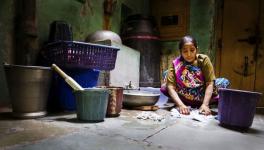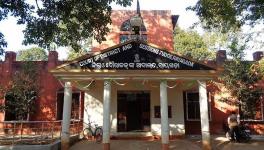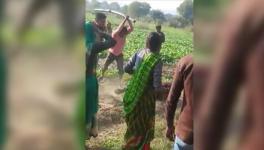Empowered Yet Demeaned: Discrimination of Dalit Panchayat Heads Continue in Tamil Nadu
Tamil Nadu, even though known for its struggle for social justice, also holds the dubious distinction of being a state with some of the highest cases of caste discrimination and atrocities against the Scheduled Caste (SC) and Scheduled Tribe (ST) communities. The elected peoples’ representatives of the local bodies are no exception to this cruel practice, with several such cases making headlines recently.
From denying permission for the president of the panchayat to hoist the national flag to denying them chairs during the meetings, these caste based atrocities are varied and numerous. More than 10 panchayat presidents, predominantly women belonging to the SC community have reported horrifying experiences from their colleagues and government officials, who seem to be hand-in-glove with the offenders.
VARIOUS FORMS OF DISCRIMINATIONS PREVAIL
The first incident of discrimination of a dalit women panchayat was reported from Aathupakkam in Tiruvallur district when the president, Amrutham, was prevented from hoisting the national flag on Independence day. The vice president and the panchayat secretary had earlier prevented her from the right during Republic day as well, which didn't make much hue and cry initially.
Following this, the district administration acted on media reports and Amrutham hoisted the flag on August 20, with the full attendance of the district administration.
Also see:
The most recent incident on November 15, involved an attack on the president of a panchayat in Ariyalur district by the vice president, in presence of the Block Development Officer (BDO). A playground in the panchayat was maintained and opened for public use by the president, following which the vice president reportedly used his goons to damage the ground. When the president raised questions about the alleged destruction, the president and her husband were attacked by the vice president and a group of his supporters.
Many other incidents on discrimination of dalit women panchayat presidents have been reported from different districts including Tiruppur, Tiruvallur, Cuddalore, Nagapattinam, Pudukottai, Mayiladuthurai and Salem.
The denial of permission to sit in chairs during meetings, passing of sexiest and casteist remarks, prevention of performing duties and denial of possessing office keys are the discriminations in practice.
ADMINISTRATIVE CONTROL, A KEY FACTOR
The state government reserved 50% of the posts in rural and urban local bodies to women, to empower them in governing the local bodies in 2016. While around 4,700 panchayat head positions were allocated to women from general category, another 1,650 positions were reserved for dalit women and 127 positions for ST women out of the total panchayats in the state.
Though women from SC, ST communities are elected to the post, the dominant caste vice presidents and ward councillors continue to deny them the power to run the administration. They are, most of the times aided by the panchayat secretaries.
Samuvel Raj, general secretary of the Tamil Nadu Untouchability Eradication Front (TNUEF) told NewsClick, “The dalit panchayat presidents are continuously facing caste discrimination from the dominant caste representatives. More often, the vice presidents from the dominant caste in the panchayat want to run the show, overshadowing the dalit women heads leading to altercations as well. This is being done to project themselves as the undisputed leader in the locality and push back the dalits from the limelight”.
In most of the recent incidents, the culprits are booked under SC/SC (Prevention of Atrocities) Act, the dubious record of very low conviction rate in such cases barely gives hope.
‘EXERCISING POWER AN UPHILL TASK’
The village panchayats, the fundamental structure in the three-tier panchayats are entrusted with works including construction repair and maintenance of all village roads, lighting of public roads and places, cleaning of streets and improving sanitary conditions and implementation of schemes including Mahatma Gandhi National Rural Employment Guarantee Scheme.
“The dominant caste members refuse to accept dalits and dalit women in particular, as their representative. The caste pride and patriarchy existing in the society also play a role in the discrimination and atrocities against dalit panchayat heads,” added Samuvel.
The dominant caste population in Arumanthai panchayat of Tiruvallur district found a novel way to discriminate the dalit panchayat president, by restricting her from visiting the wards of the dominant caste people and barred her from carrying out any development works in the area.
“Though the panchayat heads are empowered with rights, the caste hierarchy prevailing in the society finds new ways to discriminate and refrain from accepting them. The dalits can occupy the post for five years duration, but exercising the powers in running the administration and implementing development works remains a huge task,” Samuvel further said.
UNTOUCHABILITY PRACTICE AND REFLECTION IN LOCAL BODIES
The state has a history of practicing untouchability practices, with more than 600 villages continuing the inhuman practice. The practice includes even the construction of untouchability walls and fences to prevent dalits from entering the areas occupied by the dominant caste, in addition to two tumbler systems in shops, attack on funeral possession among many others.
The prevailing practices, often justified as a tradition, are reflected in the public offices as well. The discrimination is not new in the local bodies, as the state has reported many cases in the last decade.
Dr A Bhagath Singh, an anthropologist, said, “The cruelties against dalit panchayat heads has been rampant for several years in the state. Now that the media is more vigilant, more cases are coming out in recent years. The caste fanatics have continued to carry out brutal attacks on dalit presidents who refuse to cede to their commands.”
In 2006, the president of Nakkalamuthampatti panchayat of Kuruvikulam union in Tirunelveli district was hacked to death by his predecessor and her husband.
Also read: Caste-based Violence Continues Unabated in Tamil Nadu Despite Lockdown
“The president of Thalaiyuthu panchayat, Krishnaveni was brutally attacked in 2011, by anti-social elements led by a dominant caste ward member for initiating steps to take back encroached lands for development works. She survived but lost her fingers and even an ear,” added Bhagath.
Both of these presidents belong to the Arunthathiyar community, considered to be the lowest in the caste hierarchy.
“The Arunthathiyars remain the most affected in the society as well as in the local bodies, but members of other SC communities are no exceptions to the discrimination,” Bhagath said.
Though reservation for the socially oppressed has been ensured in the local bodies, the task of overcoming the social stigma and discrimination is still haunting them. Implementation of reservation alone has proven to be insufficient and the government needs to ensure the rights of the dalit community representatives are exercised in true sense. These incidents show that the change in attitude of the society remains a huge challenge, which continues to carry the communal, feudal and patriarchal characteristics for long.
Get the latest reports & analysis with people's perspective on Protests, movements & deep analytical videos, discussions of the current affairs in your Telegram app. Subscribe to NewsClick's Telegram channel & get Real-Time updates on stories, as they get published on our website.
























